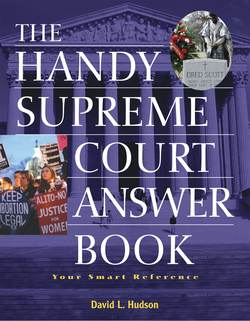Читать книгу The Handy Supreme Court Answer Book - David L Hudson - Страница 233
На сайте Литреса книга снята с продажи.
What famous case involving the selling of lottery tickets established the power of federal courts to review state laws?
ОглавлениеThe case that resolved an important question of the power and jurisdiction of federal courts was Cohens v. Virginia (1821), a case involving the selling of lottery tickets. Jacob Cohen started Cohen’s Lottery and Exchange Office of Baltimore and brothers Philip and Mendes Cohen managed the Norfolk branch. The Cohen brothers sold national lottery tickets, an activity approved by the federal government and administered by officials from the District of Columbia.
The problem was that the state of Virginia wanted to promote its own lottery. The state passed a law in 1820 that prohibited the sale of out-of-state lottery tickets. State officials charged the Cohens with violating this law because they were selling District of Columbia lottery tickets. While the Cohens were only fined $100, the case was important to them because it affected the vitality of their business. The case is important historically because it involved an important question of federal judicial power.
Convicted in a local state court, the Cohens appealed to the U.S. Supreme Court, contending that the national lottery was a federal institution that the states could not regulate. The state of Virginia argued that the U.S. Supreme Court did not have jurisdiction to hear an appeal in this state court conviction under a state law. The state of Virginia also argued that the Supreme Court could not hear the case because of the Eleventh Amendment, which generally provides for state immunity from lawsuits by private individuals. Chief Justice John Marshall’s opinion established the supremacy of the federal judiciary. He ruled that the Eleventh Amendment had no application and that Section 25 of the Judiciary Act of 1789 gave the U.S. Supreme Court the jurisdiction to review state laws alleged to be repugnant to the U.S. Constitution.
CourtSpeak: Supremacy of the Federal Judiciary In Cohens v. Virginia (1821)
Chief Justice John Marshall: “The constitution and laws of a state so far as they are repugnant to the constitution and laws of the United States, are absolutely void. These States are constituent parts of the United States. They are members of one great empire—for some purposes sovereign, for some purposes subordinate. In a government so constituted, is it unreasonable that the judicial power should be competent to give efficacy to the constitutional laws of the legislature? That department can decide on the validity of the Constitution or law of a State, if it be repugnant to the Constitution or to a law of the United States. Is it unreasonable that it should also be empowered to decide on the judgment of a State tribunal enforcing such unconstitutional law? Is it so very unreasonable as to furnish a justification for controlling the words of the Constitution?
“We think it is not. We think that, in a government acknowledgedly supreme, with respect to objects of vital interest to the nation, there is nothing inconsistent with sound reason, nothing incompatible with the nature of government, in making all its departments supreme so far as respects those objects and so far as is necessary to their attainment. The exercise of the appellate power over those judgments of the State tribunals which may contravene the Constitution or laws of the United States is, we believe, essential to the attainment of those objects.”
